Aging Brain

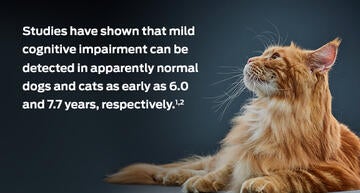
Similar to humans, aging in pets results in numerous metabolic, functional and physical changes in the brain.
Many of these changes are undesirable, and some may be irreversible. These changes may affect cognition – a pet’s ability to learn, solve problems, and remember. However, even observant owners may not recognize this cognitive decline until there is a sudden change in their pet’s behavior.
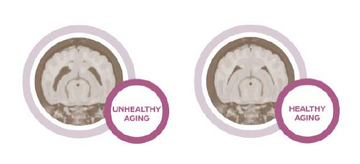
Fortunately, aging pets don’t have to act old: Purina’s research has shown that early intervention through targeted nutrition using medium-chain triglycerides (MCTs) and other targeted nutrients can help support brain function in dogs and cats as they age. Therefore, middle-age is the time for veterinarians to start talking to owners about aging, the signs of abnormal aging, and strategies to promote a healthy brain.
Insights into how pet owners view their senior pets

Changes in the aging brain
Physical changes in the brain associated with aging include:
- Atrophy (shrinkage) of tissue in some regions
- Increased ventricular volume
- Loss of neurons and synapses and reduced formation of new neurons
- Accumulation of abnormal proteins
Other significant changes include:
- Reduced glucose utilization
- Chronic inflammation
- Vascular changes
- Reduction/deterioration of myelination
- Abnormalities of astrocytes and neuron-supporting cells
- Impaired destruction and clearance of abnormal/damaged proteins
- Alterations in gene expression
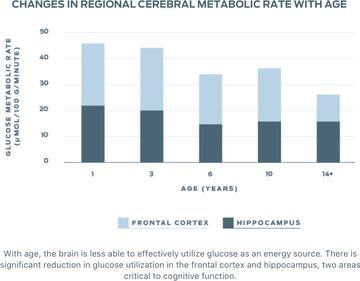
Behaviors associated with aging in dogs and cats

In some pets, age-related cognitive impairment doesn’t affect day-to-day functions and would only be detected through validated cognitive testing. For other pets, the cognitive decline may be mild but noticeable to the owners. In the extreme, the impairment can be severe enough to cause cognitive dysfunction syndrome, similar to dementia in people, and be very obvious.
Some of the signs owners observe in senior pets, as reported to veterinary behaviorists, are shown in these figures.2 Cognitive decline and cognitive dysfunction exist on a spectrum, so their clinical signs overlap.
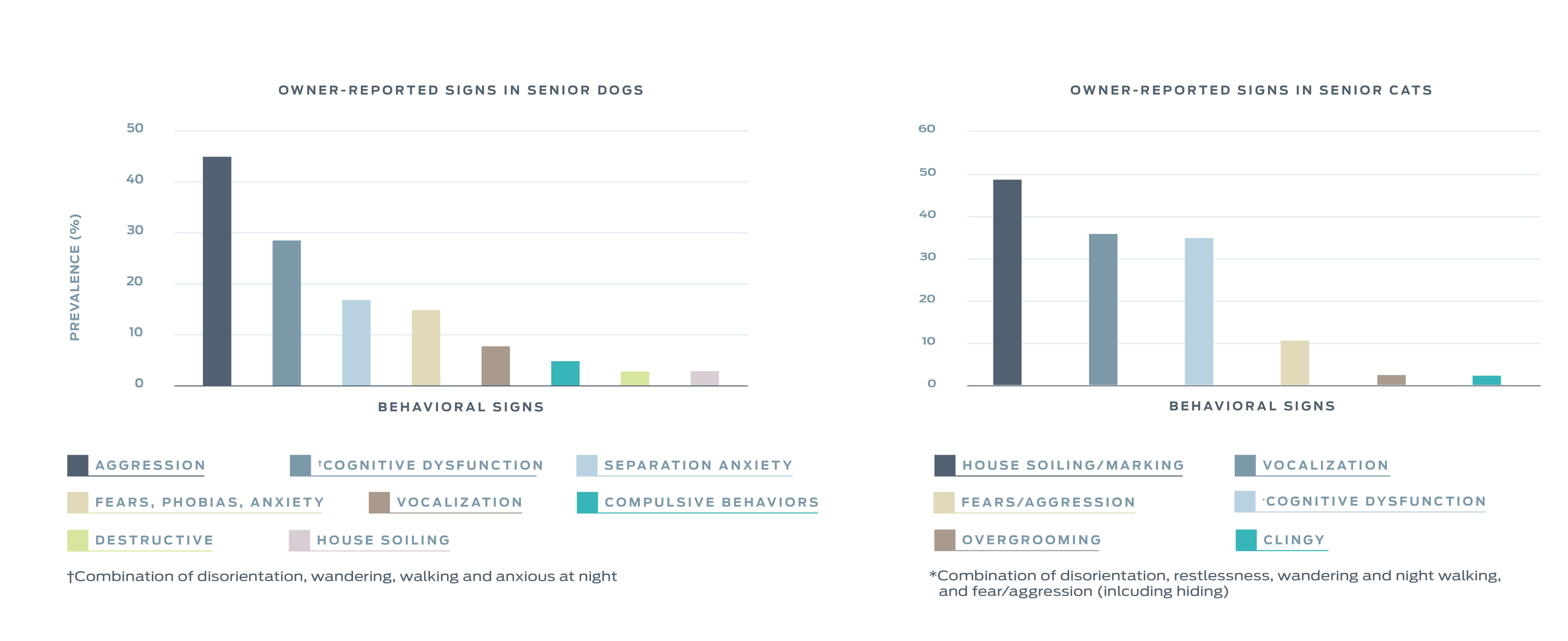
Behaviors that may be observed with cognitive decline include increased anxiety and reduced coping ability (including destructive behaviors); compulsive behaviors; confusion; altered social interactions, reduced ability to navigate environments; changes in sleeping; decreased response to commands; reduced ability to predict feeding time; and changes in toileting and feeding behaviors.4,5
Nutrients targeting risk factors to mitigate age-related changes
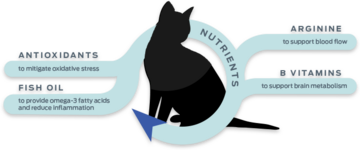
Through nutritional interventions targeting some of the known age-related brain changes, we may be able to mitigate the chain reactions that lead to the irreversible changes that cause cognitive decline. Combinations of nutrients may provide additive benefits beyond those gained from supplementation with a single nutrient.
Antioxidants
Antioxidants include a wide range of substances that scavenge free radicals by either preventing their formation or removing them before they can cause damage. The body produces its own (endogenous) antioxidants; however, endogenous antioxidant capacity decreases with age and the production of free radicals increases with age, causing a dangerous imbalance (oxidative stress). Providing dietary antioxidants may help reestablish the balance and reduce oxidative damage.
Fish oil
In particular, the omega-3 fatty acids docosahexaenoic acid (DHA) and eicosapentaenoic acid (EPA) play critical neuroprotective and anti-inflammatory roles. Fish oil provides an excellent source of DHA and EPA.
Arginine
L-arginine is an amino acid that is metabolized in cells, including neurons, to form nitric oxide (NO). Neural activity during cognitive tasks is highly associated with increases in regional blood flow, which is primarily mediated by NO. L-arginine is also metabolized to agmatine, a neurotransmitter.
B vitamins
Certain B vitamins, especially thiamine (B1), pyridoxine (B6), folate (B9), and cobalamin (B12) are particularly important to neurodevelopment and cognitive function. B vitamin deficiency can lead to elevated blood levels of the amino acid homocysteine, which is a risk factor for cognitive impairment. B vitamin supplementation reduces the risk of deficiencies and homocysteine accumulation, thereby reducing one of the risk factors for cognitive impairment.
Ketones from medium-chain triglycerides
The adult brain is dependent on glucose for energy. Age reduces the brain’s ability to utilize glucose as an energy source, even when it’s available. Due to the brain's high energy demands, it is particularly vulnerable to inadequate energy supply resulting from altered energy metabolism. Reduced glucose metabolism in the brain starts a chain reaction that may eventually lead to brain cell death and non-reversible loss of brain mass, as well as physical and behavioral changes.
In the face of compromised glucose metabolism, neurons may need an alternative energy source to support normal function. Although brain glucose metabolism decreases with aging, brain ketone metabolism appears unaffected and lends itself to nutritional intervention. Ketone bodies can provide up to 60–70% of the brain’s energy during prolonged fasting and low glucose availability.6
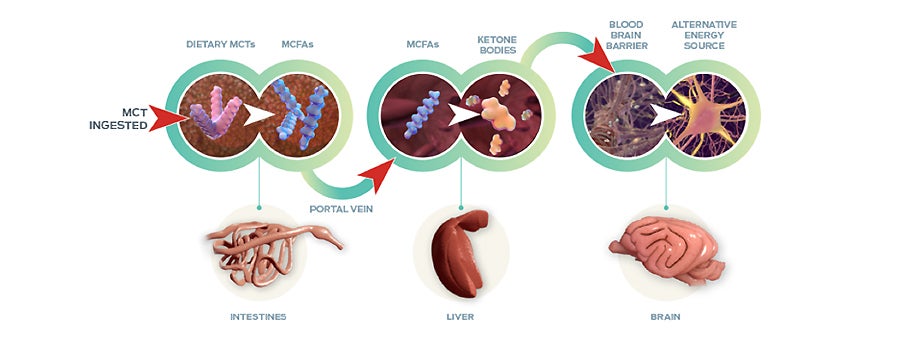
Ketones have neuroprotective benefits beyond energy production. They decrease the production of reactive oxygen species (ROS) that cause oxidative stress; enhance regulation of synaptic function through mitochondrial biogenesis (formation of new mitochondria); and stimulate synthesis of beneficial polyunsaturated fatty acids. They may also promote mitochondrial function and stimulate the pathways that help clear abnormal proteins.
Dietary medium-chain triglycerides (MCTs) provide a source of ketones when metabolized. MCTs are fats found in botanical oils, such as coconut oil. Medium-chain fatty acids from MCTs also provide energy and may help restore mitochondrial function, which may provide long-lasting benefits for cellular metabolism and function.
Purina's research

Protecting Brain Health in Aging Dogs
Purina research has led to breakthrough discoveries for protecting brain health in aging dogs.
Targeted nutrition to address several brain-aging risk factors can help preserve cognitive function and support cognitive health in aging dogs.
By providing ketones from medium-chain triglycerides (MCTs) as an alternative energy source for the brain, we can target the metabolic changes that contribute to cognitive decline. Purina research showed that senior dogs fed a diet containing MCTs made fewer errors on cognitive tests assessing awareness, perception, reasoning and adaptability, with improvement in memory beginning within 2 weeks. Senior MCT diet-fed dogs also performed better than control diet-fed dogs as the tasks became more complex.7
Dog owners from outside the study also reported dramatic improvements in their dogs’ activity levels such as liveliness and playfulness.
Purina research showed that dogs fed a diet supplemented with a blend of fish oil, antioxidants, arginine and B vitamins made fewer errors on more complex tasks assessing problem-solving ability. As the tasks became more complex, the dogs on the supplemented diet made significantly fewer errors than those on the control diet.8
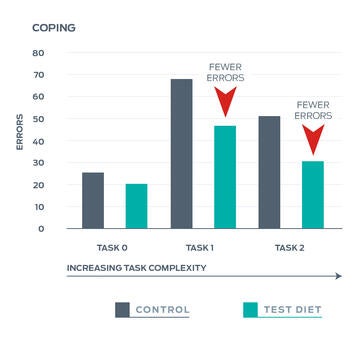
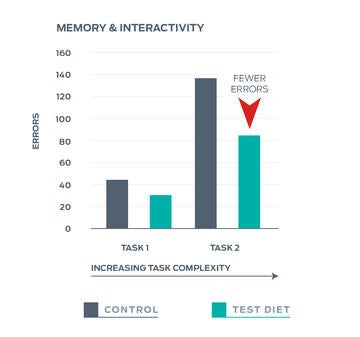
Protecting optimal cognitive function in cats
Purina research showed cats fed a diet containing a blend of targeted nutrients (fish oil, antioxidants, B vitamins and arginine) performed better on cognitive tests of memory, learning, mental flexibility and object discrimination.9 This included making fewer errors when tested on their problem-solving ability and visual learning.
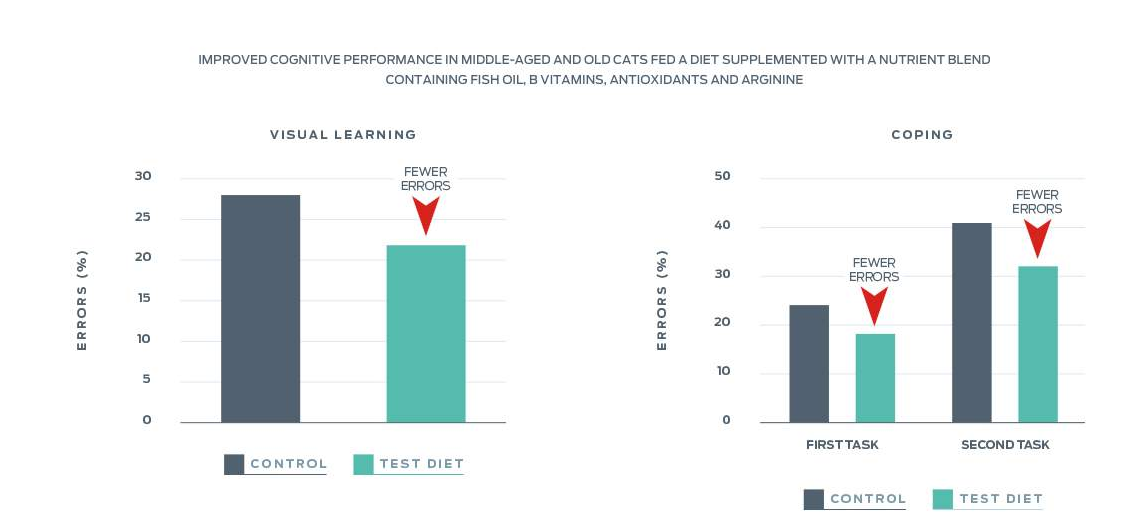
New developments in brain research
Brain research is at forefront of our science. We pride ourselves on bringing the latest findings to your attention, presented with a practical angle, to help you to stay ahead in your field. Download the latest articles here.
Key things to remember
- Age-related physical, metabolic and functional changes in the brains of middle-aged pets may set the stage for cognitive impairment or dysfunction as seniors, and the severity and progression of these changes determines the pet’s brain health later in life;
- The aging brain has a less efficient energy metabolism due to changes in glucose utilization and impaired mitochondrial function;
- Owners of older pets may not consider their pets as ‘senior’ until they notice behavioral changes caused by age-related brain changes;
- Purina demonstrated that a blend of nutrients can target the risk factors of brain aging to preserve optimal cognitive abilities in adult cats and dogs;
- Middle-age is the time to start talking to owners about aging in their pet, how to detect signs of abnormal aging, and strategies to promote brain health.
Find out more
1. Studzinski, C. M., Christie, L.-A., Araujo, J. A., Burnham, W. M., Head, E., Cotman, C. W., & Milgram, N. W. (2006). Visuospatial function in the beagle dog: an early marker of cognitive decline in a model of human aging and dementia. Neurobiology of Learning and Memory, 86, 197–204
2. Landsberg, G. M., Nichol, J., & Araujo, J. A. (2012). Cognitive dysfunction syndrome: a disease of canine and feline brain aging. Veterinary Clinics of North America Small Animal Practice, 42, 749–768. doi: 10.1016/j.cvsm.2012.04.003
3. London, E. D., Ohata, M., Takei, H., French, A. W., & Rapoport, S. I. (1983). Regional cerebral metabolic rate for glucose in beagle dogs of different ages. Neurobiology of Aging, 4, 121–126
4. Schütt, T., Toft, N., & Berendt, M. (2015). Cognitive function, progression of age-related behavioral changes, biomarkers, and survival in dogs more than 8 years old. Journal of Veterinary Internal Medicine, 201, 1569–1577. doi: 10.1111/jvim.13633
5. Cory, J. (2013). Identification and management of cognitive decline in companion animals and the comparisons with Alzheimer disease: A review. Journal of Veterinary Behavior: Clinical Applications and Research, 8, 291–301
6. Nugent, S., Tremblay, S., Chen, K. W., Ayutyanont, N., Roontiva, A., Castellano, C.-A. & Cunnane, S. C. (2014). https://www.ncbi.nlm.nih.gov/pubmed/24388785 Brain glucose and acetoacetate metabolism: a comparison of young and older adults. Neurobiology of Aging, 35, 1386–1395. doi: 10.1016/j.neurobiolaging.2013.11.027
7. Pan, Y., Larson, B., Araujo, J. A., Lau, W., de Rivera, C., Santana, R., Gore, A., & Milgram, N. W. (2010). Dietary supplementation with medium-chain TAG has long-lasting cognition-enhancing effects in aged dogs. British Journal of Nutrition, 103, 1746–1754. doi: 10.1017/S0007114510000097
8. Pan, Y., Kennedy, A. D., Jonsson, T. J., & Milgram N. W. (2018). Cognitive enhancement in old dogs from dietary supplementation with a nutrient blend containing arginine, antioxidants, B vitamins and fish oil. British Journal of Nutrition, 119, 349–358. doi: 10.1017/S0007114517003464
9. Pan, Y., Araujo, J. A., Burrows, J., de Rivera, C., Gore, A., Bhatnagar, S., & Milgram, N. W. (2013). Cognitive enhancement in middle-aged and old cats with dietary supplementation with a nutrient blend containing fish oil, B vitamins, antioxidants and arginine. British Journal of Nutrition, 110, 40–49. doi: 10.1017/S0007114512004771


